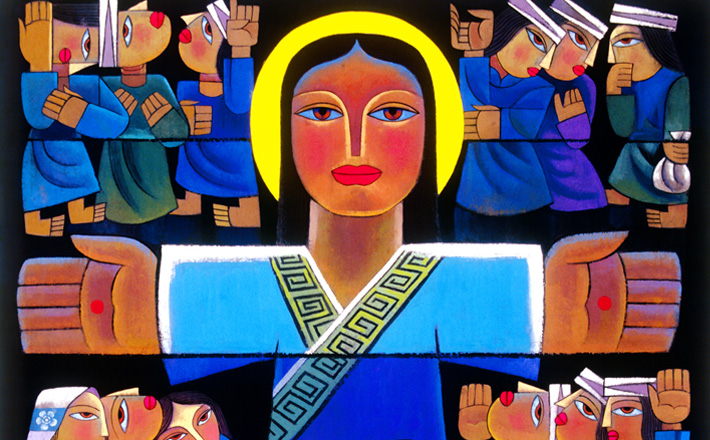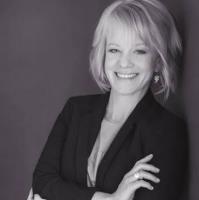Commentary on Psalm 150
Duke Ellington’s Sacred Concerts series included a number entitled “Praise God and Dance,” a direct invocation of Psalm 150:4: “Praise the Lord! With trumpet sound, with lute and harp, with tambourine and dance!”
Peter Lavezzoli notes that the Sacred Concerts illustrated “how jazz, long denounced in religious circles as vulgar ‘devil’s music,’ can rise to the level of the sacred.”1 Ellington’s genius in quoting Psalm 150 helps to demonstrate that long before the Sacred Concert series, the ancient Israelites recognized that all musical instruments could be used to praise their God. After all, as biblical scholars regularly note, the psalm seems to list all the instruments known to the ancients. In the world behind the text of Psalm 150 — in other words, in the world that produced the psalm — no musical instrument was too loud, too clanging, too clashing, or too “vulgar” to praise the Israelite God.
The world in the text of Psalm 150 reiterates over and over again the importance of praise. From start to finish, Psalm 150 is solely concerned with the praise of God. In fact, every verse includes the Hebrew halelûyah, the plural imperative of the Hebrew verb hallel, “to praise” + yah (a shortened form of Yhwh, the divine name). The command is repeated often more than once in a verse in only six short verses (plus a jussive form in the final verse), is intended for everyone — indeed, for “all that breathes” (v.6). The psalm begins with a command to praise Yhwh in his holy place (likely a reference to the Temple in Jerusalem) and, more broadly, “in his mighty firmament” (language that invokes the creation of the entire cosmos from Genesis 1 — in short, all of God’s world and creation).
Why all this praise? Many of the preceding psalms focus on the reasons to praise God, but Psalm 150, somewhat famously, focuses primarily on how and where to praise — not why. Each of the following verses is an intensification of the previous — the praise seems to get louder and louder: first with trumpet (v. 2a), then with lute and harp (v. 2b); next with tambourine and dance (v. 3a), then next with strings and pipe (v. 3b); then again with clanging cymbals (v. 5a), then with “loud clashing cymbals” (v. 5b). With each additional instrument listed, the crescendo of praise grows louder, less controlled.
If readers zoom out from the world in the text of Psalm 150 itself to focus on the larger textual world of the fifth and final book of the Psalter found in Psalms 107-150, the swelling of praise grows louder still. Psalm 146 marks the first cymbal crash of praise in its beginning and end: Praise the Lord (vv. 1, 10)! The next three psalms are also each bookended by the imperative to praise Yhwh (Psalm 147:1, 20; 148: 1, 14; 149: 1, 9). Accordingly, in Psalm 150, as in the preceding four books that comprise the book of Psalms, the fifth book of the psalter ends with a doxology (see also Psalm 41:13; 72:18-19; 89:52; 106:48).
Yet if readers pan out even further yet and examine the entire book of Psalms, the crescendo increases yet again. Psalm 150 also functions as a doxology to the entire book. The final psalm closes not only the fifth book of the psalter, but the whole psalter as well. The psalm lists no reasons why one should praise, but only the imperative to do so: Praise Yhwh! Perhaps the final editors of the book of psalms felt that the preceding one hundred and forty nine psalms more or less summed up all the reasons why one might praise Yhwh. Or, perhaps, with its call to praise loudly, unabashedly, with music and dance, a call directed at everything that breathes, Psalm 150 is a stark reminder that for the world of the ancient Israelites praise abides above and beyond all else, even above and beyond a reason for praise. Hallelujah, no mater what or why.
During Easter, praise might come easy — after all, it’s Easter. When Psalm 150 is paired with texts like Acts 5:27-32 (Peter and the apostles are persecuted — but they remain faithful to God), Revelation 1:4-8 (John of Patmos’ opening words to the seven churches of Rome, with the doxology that emphasizes Christ’s pending return and God’s authority), or John 20:19-31 (Jesus’ appearance to the disciples and Thomas’ encounter with the risen Christ), as it is during Year C, a psalm full of nothing but a call to praise makes sense. It likely feels right — after all, Easter gives reason for praise. During Easter season, the disciples might doubt, like Thomas does, but they eventually get it; the apostles might be persecuted, but they remain faithful to God (and Gamaliel speaks in their favor, too); the early church might feel alone and oppressed in the hugeness of the Roman empire, but they are nevertheless assured that the Lamb will return soon.
Yet take Psalm 150 out of the Easter liturgy, and it can be more difficult. After all, there are moments and days and times and seasons when praise of an all-powerful creator or the world God made does not come easy — nor does it feel natural or, perhaps, even right. In the face of disaster, next to the bedside of a cancer patient, by a grieving parent — the imperative to praise can ring hollow, no matter how big or grand or amazing the creator’s deeds might be. Yet the place of Psalm 150 in the world of worship has not always been consigned to a lectionary reading in the year. Rather, in Jewish and Roman Catholic tradition, this psalm has played a role in the everyday — the time and space where the reality of wanting to cry out and lament instead of praise might seem more prevalent than during the Easter season. In Judaism, Psalm 150 is part of the every day morning service. In Catholicism, the “Morning Rite” (Lauds) includes Psalm 150 in the Laudate psalms (also included are Psalm 148-149).
The call to praise found throughout Psalm 150 takes on an even more profound meaning when placed in the worship and praise of God in the day-to-day, especially when the day-to-day means early mornings, stomach aches, worries over bills, unemployment, social injustices, travel plans, or sick relatives (and, of course, all the wonderful and good things that can happen in the day-to-day world outside of Easter). Perhaps that is why Psalm 150 does not tell its readers why to praise but only how. After all, commanding praise outside the triumphant and the wonderful — the Easter season — can, depending on the day, be hard to take. This returns us to the world in front of the text, and to Duke Ellington’s masterful “Praise God and Dance!” Ellington’s piece “made jazz a vehicle for spiritual expression.”2 He combined the secular, the mundane, and the everyday with the sacred, which often seems so extraordinary and extraordinarily other, and showed how closely the two are linked. He did this as a legendary jazz performer and an African American male in a time when racism ran rampant throughout the United States. It’s hard to imagine how such a revolutionary move — bringing jazz with its trumpets and cymbals and dance — into stately cathedrals during a period of turmoil and racism could not have inspired some to praise even if there were moments and days when praise of an all-powerful creator or the world God had made, with all of its injustices, did not come easy.
The beauty of Psalm 150 — which calls everyone and everything that breathes to praise God with trumpet, cymbals, and dance, in what seems to be any and every way — is that it frees one to praise loudly, with clanging and clashing, both in times of triumph and in the day-to-day. Everyone, everywhere, praise.
Notes:
1 Peter Lavezzoli, The King of All, Sir Duke: Ellington and the Artistic Revolution (New York: Continuum), 136.
2 Ibid.


April 3, 2016